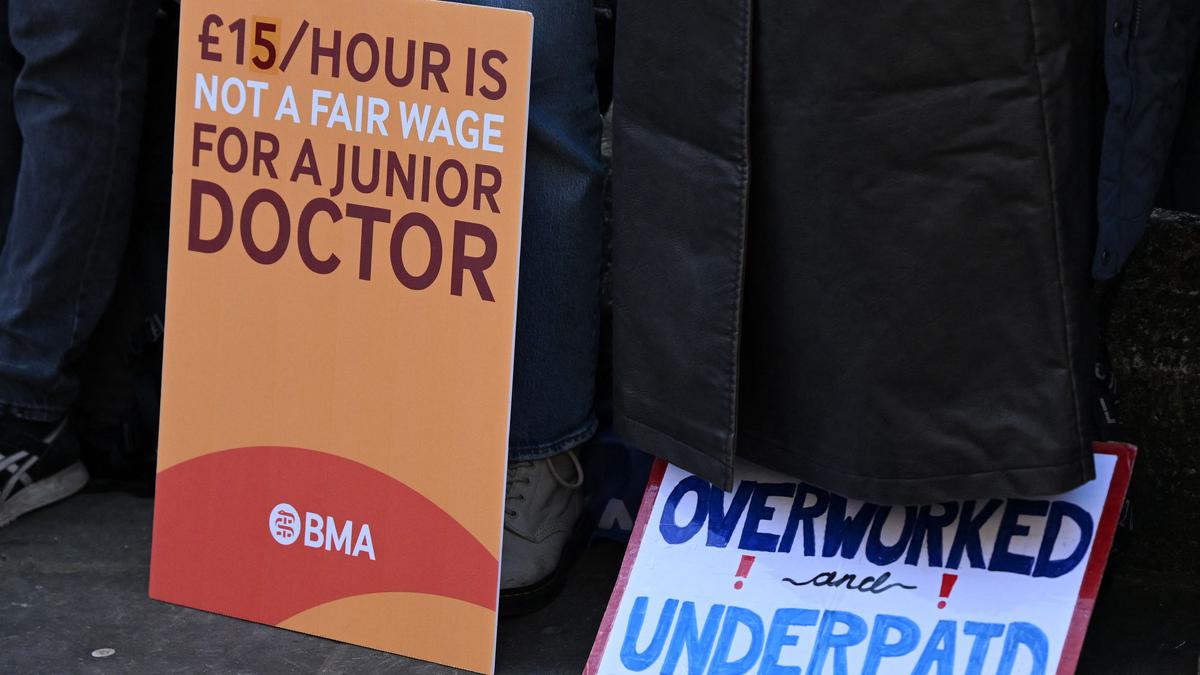
U.K. junior doctors’ ‘historic’ strike for better pay | Explained Premium
The Hindu
The Hindu explains why junior doctors in the U.K. are staging the longest walkout in the 75-year-long history of the state-funded National Health Service (NHS).
The story so far: Drawing picket lines around London hospitals, junior doctors in the U.K. staged the longest walkout in the 75-year-long history of the state-funded National Health Service (NHS). On January 3, they began a six-day strike to protest poor work conditions and the “steep decline in pay” over the last 16 years, cuts that pierce deeply amid soaring inflation rates. The strike, which is expected to disrupt critical health services, comes after talks last year between the British Medical Association (BMA) and the government failed to materialise.
“A crippling cost-of-living crisis, burnout and well below inflation pay rises risk driving hard-working doctors out of their profession at a time when we need them more than ever,” the BMA said, highlighting that this would have a cascading effect on the U.K.’s health services.
The BMA has demanded a “full pay restoration” to reverse the pay cuts triggered by the 2008 global financial crisis, which propelled the U.K. into its deepest recession since World War II. The government should put in guardrails to “prevent any future declines against the cost of living” and reform the institutional process around pay increases “to safeguard the recruitment and retention of junior doctors,” the Association has stated.
The pay dispute between the government and health providers goes back to late 2022. Nurses, consultants, radiographers and junior doctors have staged 16 strikes over the last 14 months, according to NHS England data. Junior doctors are medics undergoing official training to become specialists, a level below consultants. The latest NHS England data shows there are about 75,000 junior doctors in the workforce. Their average annual NHS earnings are between £55,420 and £57,118 — a figure which Nuffield Trust, a local NGO, predicts will fall to around 14% below levels in 2010-11 in the latest financial year. Junior doctors are earning less while working more and facing high levels of burnout, the BMA contends.
This is the ninth walkout staged by junior doctors; with previous strikes stopping work for three to six days. Initial talks last summer led to the government ceding to an average increase of 8.8%, deemed insufficient by the doctors. Pay has been reduced by more than a quarter since 2008, and the BMA has asked for a 35% pay increase. Health Secretary Victoria Atkins on January 9 said this is “simply unaffordable.”
The latest series of negotiations in November last year ended unsuccessfully five weeks later. “No doctor wants to go on strike, and we are asking the government to get back around the table and make a credible offer that we can put to our members and stop more strike action,” co-chair of the BMA Dr. Rob Laurenson told The Guardian. “But if there is not enough progress, we will have to consider further industrial action, and beyond that, our mandate.”
The six-day strike ended on January 9 at 7 a.m. GMT. If more junior doctors express support for industrial action, the Association is expected to hold another round, which could extend protests till September, according to a Guardian report.











